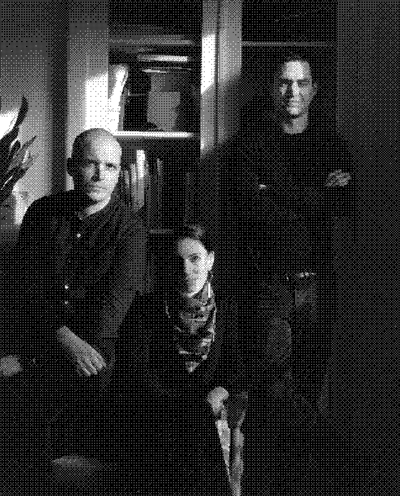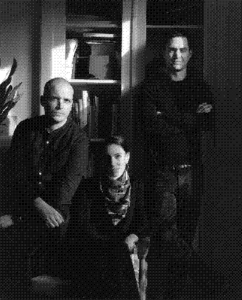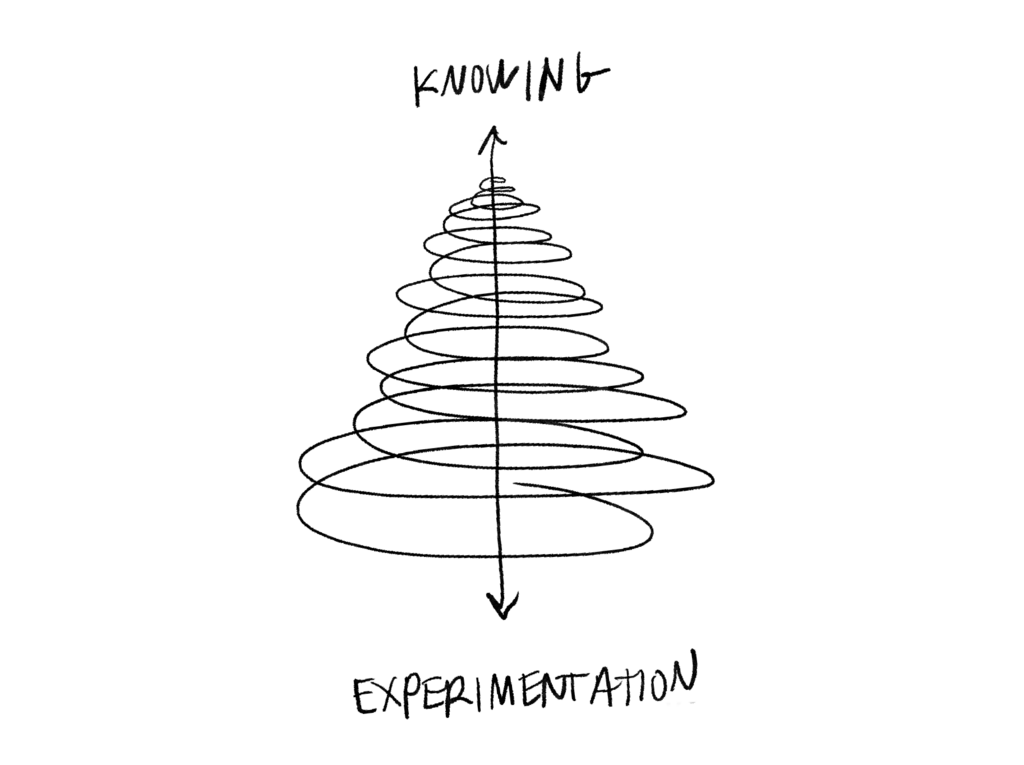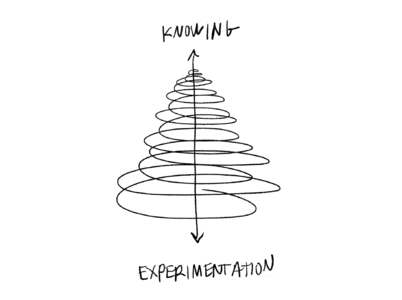Hello, guys. Could you please introduce yourselves?
AT
My name is Alex Tan. I’m a co-founder of Mouthwash Studio. But I also lead creative strategy at the studio.
AC
I’m Abraham Campillo, also a co-founder, and I lead creative direction at the studio.
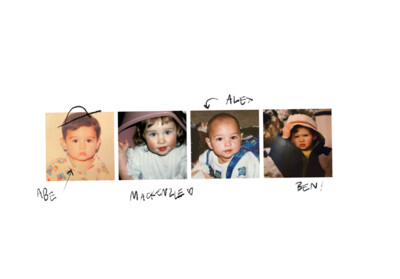
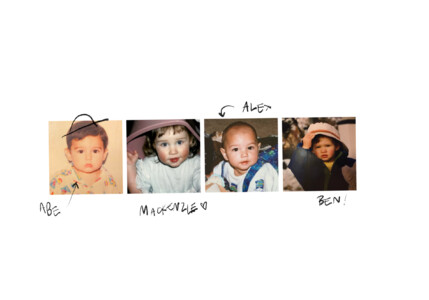
Mouthwash, Founders
How do you currently present Mouthwash and your current scope of activities?
AT
Everybody has different definitions for what all this stuff means. But the simplest way to put it is that we are a studio focused on strategy, direction, and design. We try to partner with emerging leaders and innovators in their respective spaces. But we especially like to work within the fields of art and architecture, fashion, technology, and sustainability.


Mouthwash’s Logo
Today, end of July 2023, what’s your state of mind?
AC
Optimistic. Tired. Mixed. There’s a duality in what we do. Client work can sometimes be really, really hard, to be quite honest. There’s an art and science to it. It can also be very gratifying and you get to build great relationships and do great work. But we’d be lying if we said it was easy. Year over year we’ve grown in many ways. So I’m very optimistic about the current projects that we’re on.
AT
We recently repositioned the studio to be focused on this conceptual idea of new ideas and defining experiences. And maybe we’re getting ahead of ourselves, but, in the beginning, it was really about trying to prove ourselves. Now it’s about picking and choosing our battles to create the most impactful experience possible. My mindset is really about impact: Is this something that people will continue to look at years after we’re done doing this? So, definitely optimistic, and really focused on progress and continuing to put one foot after the other.
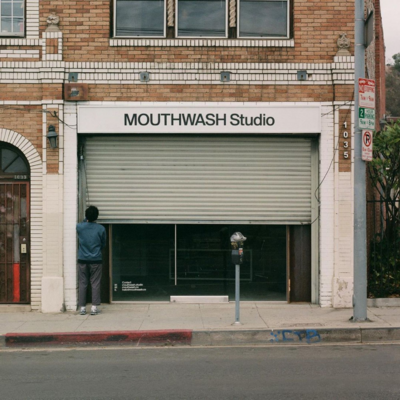
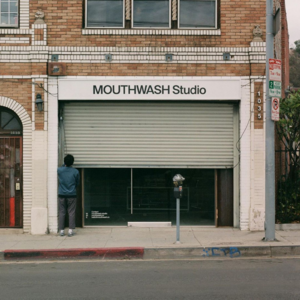
Mouthwash’s studio in LA
From the outside, it looks like you’ve had an amazing year. Has it been the busiest year of your career so far?
AT
End of last year was by far. We were running around trying to make the best work we possibly could. End of year is always crazy in the agency world. At the beginning of this year, things were—not slower because that’s a subjective term—but client work was trickling down a little, and we got to really focus on the brand and the studio. We closed a chapter of who we were over the first five years and began focusing on who we’re going to be for the next five years. It continues to be busy, but in different ways than maybe some people would frame up “busy.”
AC
I would say it is the busiest in the sense that last year was really big and we launched a lot of projects. A misconception in our line of work is how long things take. So for example, every web project that we’ve kicked off this year hasn’t launched yet. That doesn’t mean we haven’t worked on it. So I just think that Q3 and Q4 is a mix of working on projects that will launch next year, as well as companies wanting to spend their leftover marketing budget and asking for quick turnaround projects before the year ends. All those factors have made it feel like the busiest year yet. We’re going into year five which feels like an important year, because you either stagnate or you keep growing. You evolve. And we’re in that phase.
AT
A lot of strategic thinking for sure.
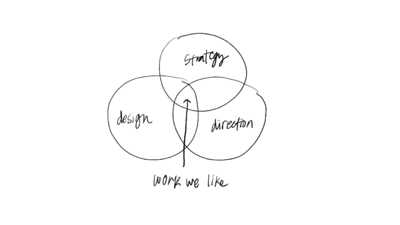
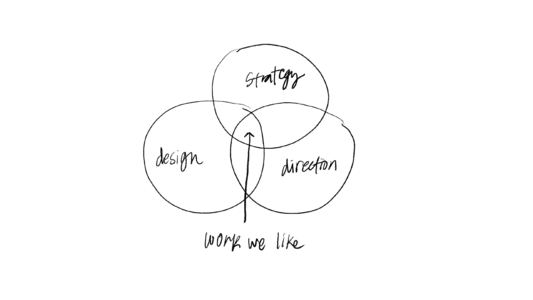
Sketch by Mouthwash
I’m not a strong believer in critical years, but there surely are some moments when you wonder, what’s the meaning of it? What got you into design?
AT
Actually all of us have similar but different ways into it. Photography and image making was the first peak interest as it relates to creativity. But a lot of that was a result of just not realizing how big the world of creative endeavors and design could be. The light bulb moment for us was realizing how important the relationship is between a photograph and the container it sits in. We realized we could tell a better, stronger, and more impactful story than if we were to just focus on the visual asset in solitude. Abraham was starting to get way more interested in design and started to understand that relationship faster than I did. And so we really did make a conscious effort to create a bigger and larger impact, by controlling the way things were digested or received.
AC
I worked at four different agencies and in-house once before we started the studio. It was a culmination of things becoming more digitized and websites needing to be made… but there’s something about templates that goes against the grain of what we believe in. So we wanted to make custom experiences. We started off by selling an image, and then an idea, and now it’s experiences. And design is a huge part of that. And now the way that we approach campaign direction is similar to how we approach design direction. Around the time this was all happening, Imet our business partners Ben and Mackenzie, who lead design at the studio. I’d worked with Ben at BASIC and we started doing passion projects together. At the same time we were also working with Mackenzie on the Mouthwash Magazine. Which is funny because there’s a duality there between print and digital.
AC
Needless to say, all of this was happening at the same time, just straight out of pure passion. We weren’t getting paid to do these things, but there was something so innocent about that but it really sprouted us to start a design agency. I also think we had spent enough time working under other people’s direction and felt like caged animals in some ways. So when we finally broke free, our first year we were extremely active. But all in all, thats how we got into design as a studio which wasn’t a very linear path.
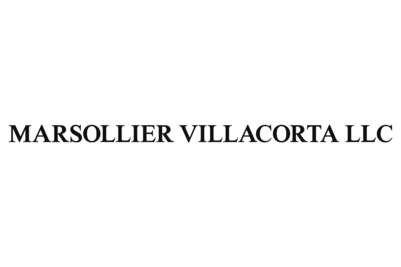
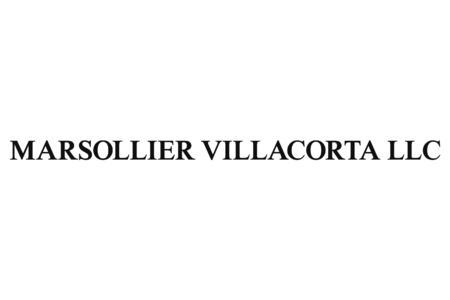
Marsollier Villacotra’s Logo
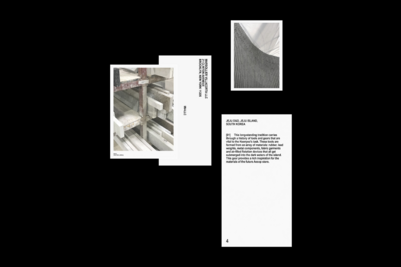
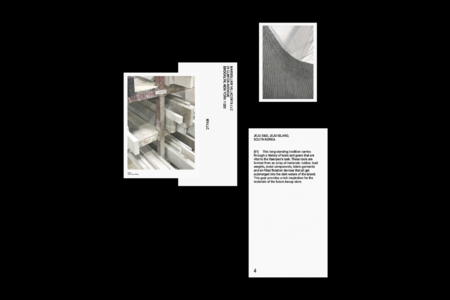
Marsollier Villacorta
And how did the four of you meet? The two of you, Ben and Mackenzie?
AT
It’s pretty funny. We were late high school, early college aged, and at the time Instagram was a platform for creative people. And we’re all from middle America. We’re not from large cities but we were all really interested in creativity and image making. And so you would naturally just find other people online that you would become friends with. We were friends online in the beginning, and then our jobs through agencies naturally led us to Los Angeles. And because we were moving to such a big city where we didn’t know anybody, the first people we hung out with were each other. Things just naturally clicked from there.
You mentioned you had a few experiences before that, but you founded Mouthwash when you were still young. How did you decide so quickly, the four of you, to found Mouthwash and what was your intuition when you founded it?
AC
It’s always been a dream of mine. While working within agencies, I was the young guy in the room that always voiced, “Hey, what are we supposed to do on social media? How do we make all these campaigns that aren’t just under television commercial budgets?” What I essentially had to do was go into these places and help them start production arms. The real change, at least for me personally, was coming to LA, meeting Alex and Mackenzie, getting to work with people that thought the same way I did. It also came from working with Ben at BASIC–the first time I was focusing on digital experience alone. It was like a snowball effect — all the elements were there, and we found that they mixed really well. Our first project with Ben was the WAKA WAKA project. It was recently part of the Apple keynote for the Vision Pro, which was insane. So all in all, there was, if you haven’t noticed, a pattern, but a very non-linear path to how it all started.
AT
I was the youngest, I was 22 when we started the studio. Abraham was 25. But I had a little bit of a head start in the sense that I didn’t finish University, and I had to learn by doing. I just started surrounding myself with people that were doing the things that I wanted to be doing. And I had to really sell myself to agencies to hire me as somebody that had ideas and could make ideas happen. I was at an agency called Matte Black where Chelsea Matthews, the Founder and Executive Creative Director, really gave me an opportunity. She just threw me in the fire: “Here’s your chance, what are you going to do with it?” Through that experience, I learned how productions get made, how creative gets sold to a client, how you actually secure budgets by selling creative. And, while Abe was teaming up with Ben down in San Diego at Basic, we were both learning rapidly, but weren’t fully happy with the types of projects that we had to work on. We felt as if it could be so much more than what it ended up being. After doing that hard and fast for a year, we thought we could do this for ourselves.
And so when we made that jump, we had an opportunity with a client that paid us enough money. We pitched them a price on a retainer that would be just enough for all three of us (Abe, Mackenzie, and myself) to leave our jobs. It was our only client and they trusted us. We won that project. So, it was really a leap of faith in the biggest sense, because we had nothing else going on.
AC
The really important thing to take away is that this idea of holistic work had been planted. So you had us teaming up with designers, and Alex was starting to write more. At first, he shied away from his natural intuition — but he’s a really good writer, and he was also reading a lot. He was strategic at heart.
AT
I just didn’t know what Strategy was. I was strategic at heart, but I didn’t know it was a thing. Or that you could sell it or do it for other people. It really came to fruition one day when we were working on a pitch for a client, and the deck just had images and design on it. And we thought, “It isn’t good enough. We need to show them what we’re going to do with it.” And so we were really learning our roles and learning our places at the same time as starting the studio. You can learn by having somebody teach you, or you can learn by doing. And we’re maybe one of the strong case studies for what it looks like to learn by doing. Because we went in with a loose plan. A lot of it was trusting ourselves and trusting our intuition.
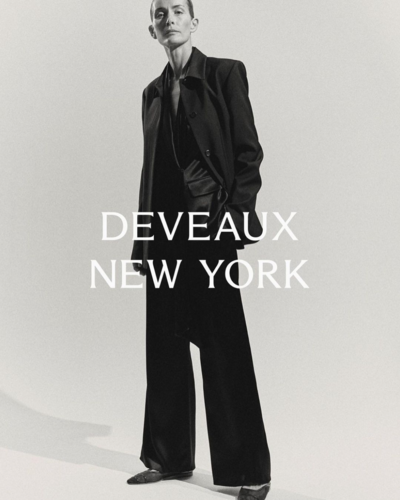
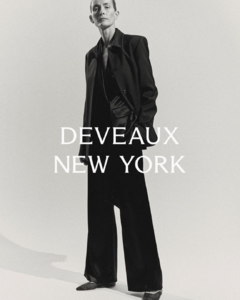
Deveaux, New York
Rose caps
Or maybe it’s also potentially that you were fast observers, you worked, you saw what was going on, and you saw a specific window to form a small team. How did you decide the name Mouthwash? Was it with the first retainer?
AT
We had nothing. We had this idea, right? And the idea was, how do we give life to an inanimate object? It has no preconceived notions. You don’t think of anything necessarily when you think of the name. The small silver lining was really this idea of a breath of fresh air or something new.
AC
Positive connotation
AT
It’s funny because usually when you come up with a name for anything in your early 20s, it’s not that good. But we still love the name and are identified by that name. This thing will change but the name is never going to limit us in terms of what this can be.
AC
Yeah. And it’s memorable. The name is important because it stood out. And that’s always one of our goals, whether we’re doing naming, design or anything else. That’s what makes us unique.
AC
And again, we were young. So it was youthful and a little oblivious.
AT
A bit of naivety.
AC
Yeah. Which is a good thing. And I try not to lose it. I’ll be 30 tomorrow, so I’m trying to not lose it, because we wouldn’t be here without it.
OEM’s home
OEM’s Website
You said the four of you were coming from middle America, so no big cultural cities. What were your creative references when you were starting uni?
AC
It changed over time. It was a mix of commercial work. I originally wanted to do television commercials. I always thought that was the dream goal. So I was referencing a lot of the clever Super Bowl spots and just trying to think of things that stop you in your tracks. I originally found Basic because they had an incredible website that stopped me in my tracks. I didn’t know you could do that with a website. I thought, “How do I do that?” I wanted to learn how to get in there. And I’m so glad I leaned into it, rather than looking at it as something to be scared of, something so far from my current skill set.
AT
I grew up in a farm town of about 3,000 people. Two stoplights, no restaurants, nothing. And so much of your life in middle America is homogenized, everything looks the same. Everybody eats the same brands of food. There’s no localized anything. My dad worked for a company that produced compact CDs. And so we had this huge catalog of music. The ‘Nevermind’ album art by Nirvana always sparked my imagination. Why did they do that? Are they allowed to do that? What’s this have to do with the music? I learned to love things that made me ask those types of questions. The internet was transformative too. I was on Tumblr and Twitter really early. That was my only connection to the outside world. And the only way I could get in contact with people who were doing interesting things.
AC
Yeah, we’re definitely Internet kids.
AT
Internet kids for sure. The influences have changed over time and I’m definitely still learning. People all the time expect me to know this artist, or know this person, or know this work. And sometimes I just don’t. And I’m still having to learn those things.
Abraham, you’ve just mentioned that one of your focuses is to maintain this level of creativity throughout your career. You’re already thinking years ahead at the moment. How do you think you’re going to maintain this level of creativity?
AC
It’s always a good question. The perspective and frame of mind is always challenging, the value trade-off and the time cost analysis of things. So whether you’re taking on an initial client or someone’s reaching out for something, there’s always a bet you’re making: Is this worth the time and energy?
Reminds me of a quote from Robert De Niro, ‘The talent is in the choices.’
AT
That’s so true.
AC
True. Essentially life is just full of choices. Projects are full of choices. And Sunk Cost Bias is a threat to every project–essentially, is someone invested into something for too long solely because they’re too far in? A more literal example is like, if you’re reading a book that you’re not getting anything out of. Do you finish it just because? We find it important to have the freedom to say, ‘Hey, this isn’t worth it anymore.’
We’ve had to do it several times and we continually have to. When you surround yourself with people that know you on a personal level and can be honest with you, you don’t get defensive, you listen and improve. That type of environment is how we innovate and push ourselves forward.
AT
I also think creativity is a practice. That’s maybe a little bit against the grain in terms of what people think creativity is. Many people think you’ll just sit around and have this light bulb moment. Abraham is one of the most disciplined people I know. People don’t know this about us but we wake up every morning, spend an hour a day writing or researching on the Internet, just developing our taste. The commitment to that practice is really the secret, there’s no shortcuts to developing creativity.
AC
There’s a quote that says ‘consistency over a long period of time looks like magic to others.’
AT
People just get really comfortable. They find the thing that works and they do that forever. In the beginning we’re all searching, wondering and trying to figure out how to get in. And then once people find their way in, they get comfortable and ride that out.
AC
And the work shows, the presentation shows, it sometimes looks like 30 minutes was spent on something before it gets sent out. It can be baffling for me, someone who is always the minority in the room, to just have that mentality. We call each other psycho because the things we do can seem illogical to some, like ‘Why would you go into business with your friends? Aren’t you scared of losing?’ We perhaps value different things.
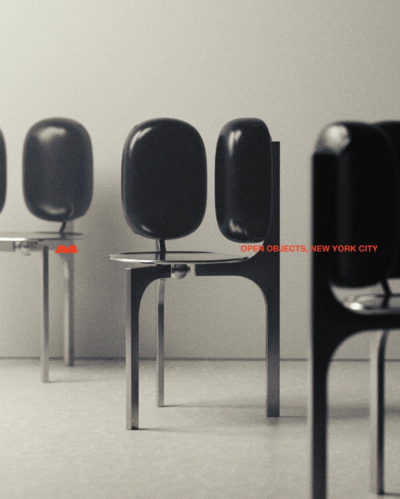
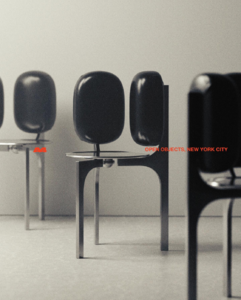
A4, Open Objects New York City
Air Company, Digital Design
It also helps explain why you don’t seem to have any specific creative rules or preconceived ideas about the format of your creations. At some stage I was looking at you —I’ve been looking at your work for a while actually—and thought, okay, graphic design and art direction. Oh, it’s also CGI. Oh, they’re also into motion design. It seems that every time you’re doing something new, you sort of integrate a skill… You have more people. It seems really interesting from the outside that. You see some studios that call themselves ‘No Discipline’ or ‘Anti-Discipline’, which might suit you as well.
AT
The focus has never been on skill set, in terms of craftsmanship. The focus is on ideas. And we don’t limit ourselves, because technology will change all this stuff, right? We can’t just be really great at Photoshop and build a career out of that. We’re way less concerned about the medium—how we get there— and we’re way more concerned about what it is that we’re saying, who we’re saying it to, and how it makes them feel. And when you open yourself up to the possibility of that, you push yourself into territories that you’re not familiar with and learn something new along the way. But one thing that we’re really good at is the creative filter. A lot of times we get hired for work that people have seen. And the question to ourselves is, ‘What can we do that is brand new to this? What can we add to this that we’ve never seen before, that maybe we saw from a completely different, unrelated field?’ We’re constantly putting ourselves to the test and making sure that we’re always adding something new, that we’re not limiting ourselves to the medium or what people are specifically asking for. A lot of the time people are just asking for a website, and they don’t realize that a website has so many things inside of it. It’s a car. And if we’re going to build a car, it needs to have all these different parts and components, and maybe we can reinvent the way certain things inside of a car work.
AC
We put value on the approach and the people. So that travels well. There are other things that we want to do, which I know we’ll get into, but we know that the team and the approach can be applied across different mediums. And that’s exciting. That opens up the possibilities of everything, when you’re not focused on systematizing everything, but on building the best products or services possible. We believe this type of thinking can open us up to arenas that feel so foreign to us currently, like software or spatial design. Especially when you have the network to bring on the right people.
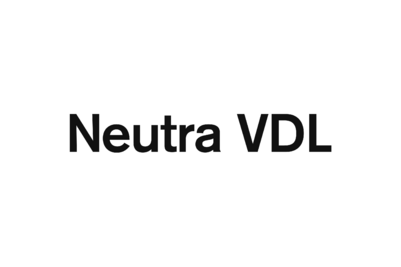
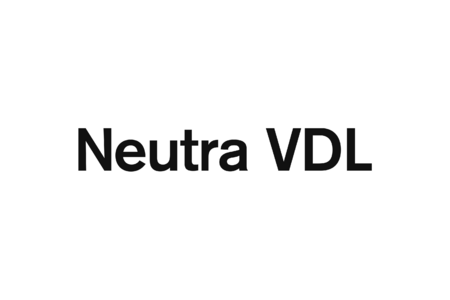
Neutra VDL’s Logo
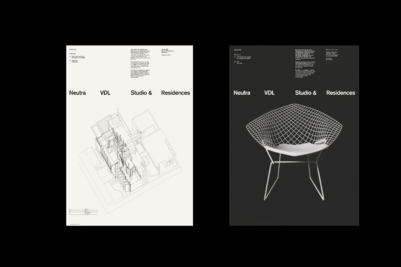
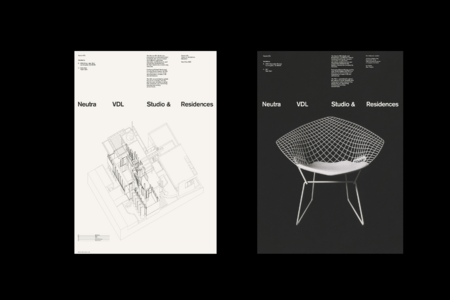
Neutra VDL
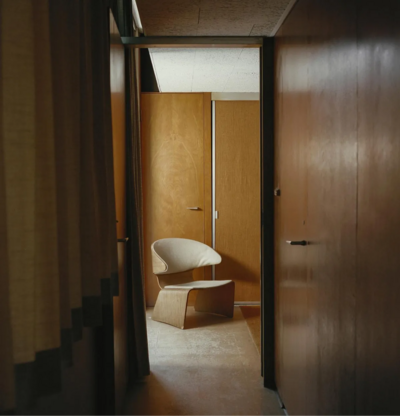
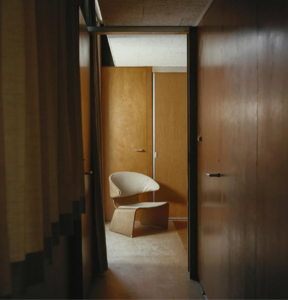
Neutra VDL
We talked a little bit about creative references. Do you have some strategic references? They can come from other fields than design, obviously, but do you have some strategic points of view that come from readings, from references?
AT
There’s a number of different case studies that can exist across a lot of different mediums. The things that are most interesting to me are people or teams that have dedicated their work or their career uncovering the edges of a specific point of view. When you look at Apple, they broke barriers in terms of what could actually be possible for premium technology, and changed an industry that was specifically aimed at a person of a certain IQ or intelligence level, to be usable for everybody. Or in the same way that Ikea created furniture that could be designed well, but also made it feel important for people because they were building it with their own hands.
And how do you decide on your development strategy? For example, you could say “If we want Mouthwash to be doing this in three years we need to do that thing before.” Are there talks about this all the time? Or do you talk about it every six months?
AT
This is something we started implementing recently, but we meet every week for an hour and just talk about where the future of the company is going, the state of the company now, maybe things that we shouldn’t do again or mistakes that we’ve made, and where we want to go in the future. It has most certainly taken time. But there’s this extreme crazy level of trust in which not every idea has to come from a strategist or a creative director or a designer. Good ideas can come from anybody. And especially as we’ve maintained that level of trust amongst the four of us, one thing that we’ve noticed is that if somebody on our team really believes in an idea and feels it can push the needle for us, then the other three people most of the time do whatever they can to help make that idea come to life. There have obviously been things that we’ve pushed forward that maybe we realized later weren’t worth focusing on. But being in constant conversation about where we want the studio to be and what would make us excited to come to work every day five years from now is the conversation that we prioritize having.
AC
We’re intentionally small so that we are able to continue being part of the work. We’re makers by nature. We’re small so that we can keep the culture, so that everyone on our team can reach us. We’re not bringing on clients and then handing them off to a junior team. They actually work with partners. We’re also trying to build languages and systems for what we’re doing. It opens up new doors that you would have never thought possible. When you get too big, you can’t do that. And you lose that innovative spirit.
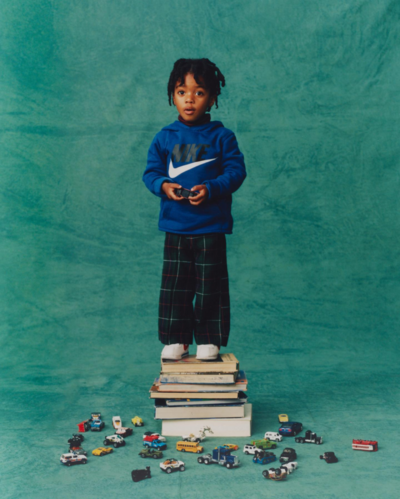
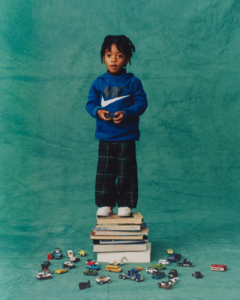
Nike Kids
What you’re saying— which rings true to me — is that you can’t have people being too precious about the strategy or the idea. You’ve got to be able to give room and space to everyone and to every idea. Sometimes in big teams or with founders there can be ego or preciousness that slow people down. So basically if someone believes in something, you’re pushing it forward. And as you say, you could have an email next week that will change all the plans. But do you still have a plan in mind at the moment? What you’re going to do in the next year or two?
AT
Yeah, we have a plan. It’s actually really timely. Internally, from an agency model, it’s less about us running an agency and more about us being a team of people that comes up with ideas and services and products that are usable and tangible by people. So while a lot of people think that the studio is our only focus, the studio is really just going to be one arm of the things that we’re trying to develop. One new vertical of the company that we’re working on standing up right now is called Mouthwash Research Center, and that is a space within the studio that is designed to give our team space to explore new territories within art, design, technology, and research. If there was no client, what would we make? What are the things that we’re interested in? What are the things that wake us up and keep us going? So that’s one part of it. We’re also looking into opening up a cafe in Los Angeles. We’ve spent innumerable amounts of time behind a computer screen over the last six years. So part of us craves to have conversations with people and have a place that is a meeting spot, something that feels like a gathering place. We’re also interested in opening up a technology arm of the studio, which could look like a roster of developers or people that help us come on to web projects. Or maybe it could lead us to creating software, or creating tools and products that people can use. And so the model shift really is that Mouthwash as a group of people is going to explore and cover the edges of multiple different things. We’ve obviously been successful with the studio, but we’re not limiting ourselves to just being a team that does client services.
AC
The way I would try to describe it from a bird’s eye view is Mouthwash LLC is the parent company. So within that parent company, which is all the same people, you have the studio— which is one entity— and we do design, strategy, and creative direction. Then we have Mouthwash development, which is web development, with a roster of developers. And the hope is that it will allow us to get into software and out of client services, trading time for money. And then finally, we’ve got the cafe, which we’re hoping to launch in the next year or two. And that’s meant to promote some things that don’t exist yet. You see public spaces less and less in the United States. We live in a capitalistic society, so everything costs so much money, people are isolated, and we’re really feeling all the negative effects.
AC
When we were starting the studio, everyone had Squarespace sites, but we believed that all these creative people should have beautifully designed sites. So we started a design studio. We feel the same way now. There aren’t enough places that gather and promote human interactions and good design at the same time. So we’ll create one. We definitely want to convey that we value people a lot. We want to actually improve our community even if it’s something we’ve never done before. I’m sure you’re noticing a pattern here.
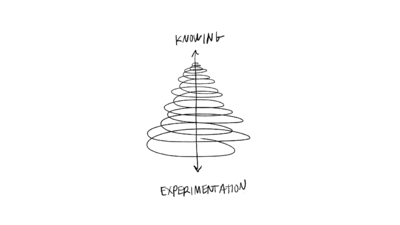
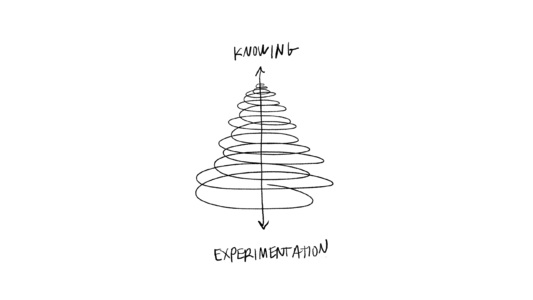
Sketch by Mouthwash Studio
From what I understand you’ll be remaining independent. Or do you think at some stage you might be open to other people or other partners or investors?
AT
The bottom line is, we’re open to anything. We’re open to any conversation. It would be foolish for us to say we’ll never do that. But there are things that we will probably never compromise on. As soon as we start making work that we don’t believe in, we’re probably going to be checked out, and not interested. And so whether or not it’s an investor or another company that wants to buy us, or we raise money for this cafe or whatever, the thing that we’ll never fold on is not being able to actualize the vision that we initially came up with. And that’s hard. That’s maybe the reason why we’ve remained independent and haven’t desperately sought after bigger partners with more financial access, because at the end of the day we don’t need more money. We just need to make things that we believe in and are proud of.
AC
I’d be open to selling, just not now. There’s so much we’d be leaving on the table. We just signed a five-year lease on our current space, so I would give it a bit more time and just see what’s possible before we entertain other things.
How many people are currently working for Mouthwash?
AT
Fourteen total. Including us.
Nike, Mother’s day campaign
Well, maybe one of you had some training in management. Or did you learn it by doing or did you read about it? How do you manage things? You mentioned the culture of the studio.
AT
One of the most overlooked things that people do in business is that they prioritize experience over people. Yeah, there is a level of experience that is required or needed, but we’re always looking at people for who they can be versus who they are now: “Are you able and compatible to learn and grow alongside us?” Because we most certainly haven’t arrived yet. It’s less about where you’ve worked, what you’ve done, the things you’ve accomplished, or the awards that you’ve won. For us, it’s more about “Are you going to show up every single day and give it your best?”
AC
We don’t hire someone and then try to find somewhere for them to work. We know what we need to have and then we find that person and then it just becomes a matter of culture fit. Our retention is extremely high. Throughout the entire time we’ve existed, only two people have ever left the studio, and we remain very good friends with them. But also even beforehand, scouting is extremely important and hiring is extremely important. You hire one bad person and that’s a million bad decisions that are going to cost you every day.
We do very little management, to be quite honest. We’re makers, so we like to surround ourselves with the right people to help us stay that.
AT
That’s an interesting point: we don’t really manage, and not in some progressive, abstract way. There are for sure expectations, there’s for sure a standard. But one thing that we’ve gotten really good at is giving people the space to feel as if they have ownership and autonomy over the things that they’re doing. So the decisions you make really do matter, because if you don’t do something, nobody’s going to do it for you. So we’re looking for people who are going to take that challenge and won’t be able to sleep at night if something they’re not happy with goes out into the world with their name on it. Obviously things happen and it’s not as serious as it sounds. But, give people enough space to operate, make their own decisions, and make them feel the decisions that they’re making within the studio actually matter. We’d also never ask our team to take on a project we wouldn’t do ourselves. It’s not like we just seek out projects for a bunch of money and then give it to a team of employees to make us more money. We would never ask anybody on the team to do something that we wouldn’t do ourselves if push came to shove.
Nike, Member days
Do you do any prospection? Do you do some proper business development, or is it mostly incoming calls and being referenced?
AC
We’ve gotten this far on intuition. No one knows our people as much as we do. No one knows the vision that we want to get. And again, we’re open to having people help us on that. But one thing I’ve always tried to avoid is not being able to independently think for ourselves. That happens when people have success and they get complacent, or maybe they get ambitious and think that they need to bring on some other people that have done it, and you lose what made you you. We don’t do any outbound marketing, but we are very diligent in the projects we do take on because that is a bet on our future. And it’s worked out so far.
We have a business strategy that is focused on industries we want to do work in. So for example, sustainability is a big one. AI is a big one. So it’s, ‘What is our work there?’ Overall there’s were industries that we knew we wanted to hit because they’re at the core of culture and that is important to us. Ton influence culture and if you’re only working with Fortune 500 companies doing NDA work, you lose some of that. You’re not cool anymore, and you’ve seen it happen with other agencies.
AT
We have a pretty strong philosophy on not selling ourselves. Shayna Fowler on our team leads new business and fields new business inquiries. But we don’t actively sell ourselves on purpose, because beautiful things don’t ask for attention. We believe that if we’ve done the project right, if we publish it right and we show it off the right way, and if we communicate the right things, it’ll attract more of the same. So we can conserve energy on trying to convince somebody to work with us versus them already making the decision in their head: ‘I want to work with these people.’ At that stage you’ve already won half the battle, right? So you’ve already done half the work by somebody knocking on your door, wanting to know more about who you are, what you do, what you can do for them. Emotionally, they’ve made this decision in their mind. And so from there, it’s just figuring out if it’s going to be a good fit. If we’re aligned on the same goals X, Y, Z. We understand the point of going out and trying to sell yourself, but most of the time the clients that are looking around for agencies, we’re not super interested in. We find that the work is much better when people have decided, ‘We want to work with Mouthwash, how do we figure out how to make that happen?’
AC
We prefer to keep the relationship on an even playing field. Respect is big for us. If we don’t feel respected, we have no issues moving on from the relationship. It’s not just about landing clients, it’s about landing the right clients — ones who value your perspective and allow you to do your best work. When clients don’t trust us, we end up delivering work that’s not up to our standards. So that’s extremely important.
AT
On that note, we’re also trying not to take on any more pitches. Again, it’s a learning by doing thing. Every time we go into a pitch, it’s just a hard way to start a relationship. So for the most part we say no to pretty much every pitch.
AC
This isn’t Love Island.
AT
Yeah, this isn’t a game show for us.
Converse × Comme des Garçons
Have you thought about being represented, having some intermediary even in Europe?
AT
Totally. I mean, there’s a lot of benefits to association and being connected with the right people. At least this far, we’re really happy with the work that we’ve made. We have much bigger ambitions to work with clients that are doing really interesting stuff. And if a person could represent us to help get more of that to our doorstep without creating more friction, then we would totally be open to that. But it would have to be a really great value proposition on our side, because we’re really happy and proud of what we’ve built so far. No need to change something if it’s not broken.
You’ve also gathered quite a following. Did it grow organically or did you have some strategy behind it?
AC
We grew up curating things and making images. So valuing curation is something we pride ourselves in, always taking the time and effort to think about how we present things. And also not being afraid to scrap things and start new. Even our studio Instagram, we scrapped it about a year in because we felt there was a better way to do it and to show off the work. It’s an ever-evolving process. We spend more time than you would ever imagine on an Instagram post or a case study. A project is not over when you hand it off the client. It’s equally important how you show that to the world. How do you communicate the important things?
There is also little incarnation of the studio, basically you don’t show your faces. It’s the work and only the work and the research now. I guess it’s a conscious decision, but how did you come to this?
AT
We’ve always just been more interested in the work speaking for itself as opposed to the one person or a group of people being prioritized. From an individual point of view, the cryptic nature and the mystique of it also drives a lot of curiosity, in a way that allows us to get our foot in the door and have a conversation with people. So if you can emotionally resonate with somebody based on how something looks or feels, you are already doing a lot of the work that showing your face may or may not do. So it was definitely a conscious decision and it’s always been about that, especially as we have grown as a team. An idea can come from anywhere. There isn’t one person or a couple people who are more important than everybody else. If one person wins, the whole team wins.
AC
Yeah, definitely let the work speak for itself. Show, rather than tell.
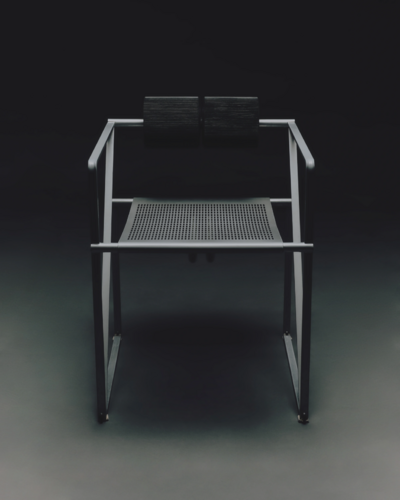
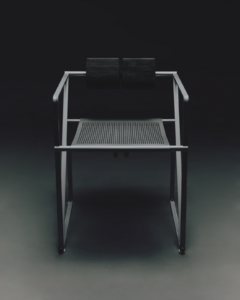
Same Old, Identity
Are you interested in conferences or teaching?
AT
We have become more open and more active in that space. As we have started to establish a reputation and a really specific point of view, we want to share it with others but when it comes to self-promotion tactics, we still want the work to speak for itself. The brand and the studio will continue on whether or not there’s one person or a couple of people that leave, and we really believe in that.
So what would be the big next step in communication for you? Would it be the cafe you were mentioning? Is it more collaborations, like the one you did with Services Generaux?
AT
One thing that we’re talking about internally is that when you get into this industry and do anything creatively, you’re often being looked at as an executor or somebody that can accomplish ideas. But in the larger scheme of things too, we’re not just a studio that makes stuff that people ask us to make, but we can self-initiate ideas too, we can make a cafe, we can make a technology studio, we can make software. And hopefully that communicates to the world too, that Mouthwash are ideas people, they have the chops to make it happen.
AC
Yeah. If these young kids from the middle of nowhere can do it, hopefully that shows that everyone can. We’re unique to our own dreams and aspirations, but we’re definitely open to more lecture opportunities. We haven’t forgotten those younger 21 year old versions of ourselves that just had no idea. There’s definitely that aspect to it.
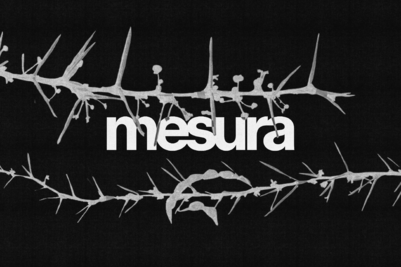
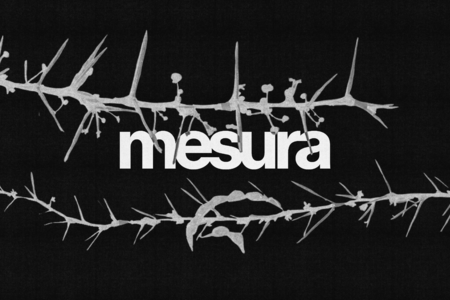
Mesura
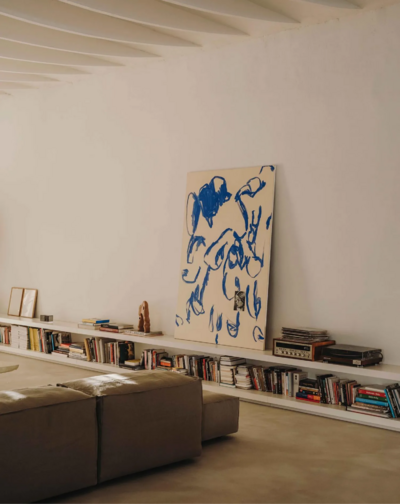
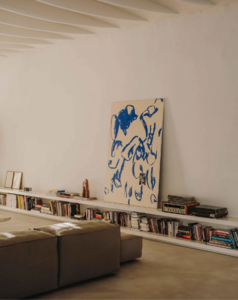
Mesura
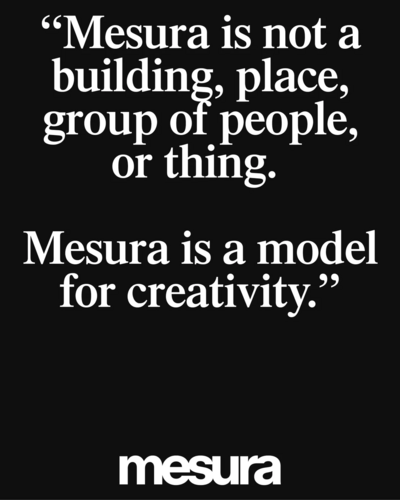
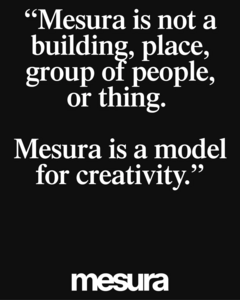
Mesura
And on the question of collabs with other studios, is this something you’ll do again?
AT
For sure, yeah. And it’s less about that being a strategy in and of itself. It’s really about defining experiences or new ideas. When we came up with this idea and pitched it to Air Company, we had Services Généraux in mind because we knew that they were going to best execute the idea and provoke the feeling that we sold to the client. Additionally, we brought on Moniker to develop the logomark for Air Company, because we knew they’d be the best. Air Company is such an amazing representation of who we are as a studio because we were able to bring in the best, most specialized talent for the thing that we were trying to accomplish. We worked with so many people and developers, and that wasn’t an accident. It wasn’t a Craigslist ad.
AC
We pitched those partners before we even signed the scope. People pay us to connect the right things. And sometimes it’s people, sometimes it’s concepts, sometimes it’s writing, sometimes it’s UX, but it’s all relative.
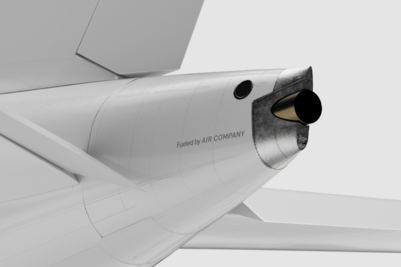
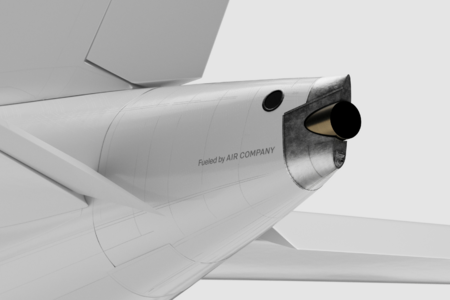
Air Company
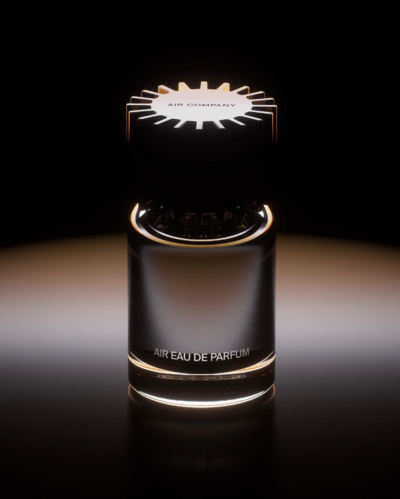
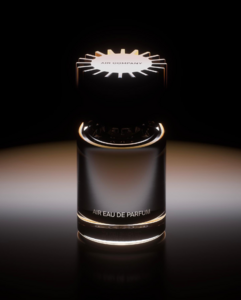
Air Company
You mentioned you were potentially working with an AI company. What do you think of brands starting to use AI creatively?
AC
You have to, it’s part of evolution. You can embrace it or you can just fall behind. Anything new generally causes people to be speculative. I know with crypto I’ve done it. NFTs in particular I was never super fond of. They’ve been around a long time, but I would say language learning models have already been used and you can benefit from them. So I’d say embrace it because it can make you.
We’ve spoken with some big brands who realized that some of their employees had put some of their retail design plans and some intellectual property into an AI tool to generate adaptations, then they realized there was no protection. What’s your perspective on this?
AT
It’s tough. It’s not a worry, at least at this stage for us, or, for me personally, just because it’s almost so easy to spot when something’s been generated by AI. So you could sit here and say, ‘Oh yeah, we don’t have to worry about that because it’s easy to tell whether or not somebody made it.’ But it would be foolish to say that there’s not going to be a day when you won’t be able to tell. And when that happens, society will either reject it or embrace it. And I would assume that it’s going to be an embrace, because humans naturally fall to whatever creates the least amount of friction in their lives.
AC
I think we’re looking at it too black and white. It’s just a tool, so it’s part of our job. People are looking toward us for expertise, and to better understand how these tools may benefit their business. Maybe it’ll help spark an idea, but I don’t think it’ll ever fully replace humans. You can almost always see when someone tries to completely remove the human part of it. Machines can’t feel.
AT
Machines will never know what you have been through as a human and the personal experiences that you have. And that’s the clear difference. If there is a day where it does, it’s going to be learning off of past experiences, not your experience as a person. And so it’s important to create with conviction.
It’s funny to think how threatened people feel by technology, but it’s nothing new. People thought that the photographic camera was blasphemy. Artists hated that shit in the beginning. Painters. They hated it.
Some photographers really hated CGI in the first place when they realized that it could be photorealistic.
AT
Yeah, exactly. It’s mostly fear over anything. We’ve seen photography become an amazing tool for us as people. Whether or not AI completely replaces photography, that’s a whole other question. But we’ll still be able to use that to create ideas and experiences. And we’re prepared for technology to change the way that we get to new ideas.
AC
That’s why Research Center exists, and that’s why we are open to having dialogue with people that think and ask these questions, because it’s all pushing us forward, hopefully.
AT
But if we were ever to be a studio that just uses AI to create websites, at some point it’s going to be limited by what it’s been taught. And so there will always be a need for more niche, more specific points of view. And it will really weed out the people who are just adopting what everybody else is doing. We live in an age of algorithms. We live in an age of sameness, and while AI can get you to a certain point faster, it doesn’t make your product much better or more unique, I would argue.
And are there other evolutions in your work, in your field, that you’re currently observing?
AC
It’s encouraging to see niche studios pop up that have high taste levels and are also highly capable. At the same time, you start to see traditional agencies fading. These very traditional agencies that grew so big that they became top heavy, large corporations almost. So I’m really excited to see more of the niche, highly capable, self-sustaining teams cross-collaborate; there’s something there and we’ve experienced it firsthand.
Mesura
There’s no recipe for success and everybody has to invent their own. As you scan what’s going on around, do you notice any other potential developments that we haven’t mentioned before? Any other thoughts, or even dreams?
AT
I love the work that we do for clients and the services that we get to do. And we’ve gotten to meet so many hundreds and hundreds, maybe even thousands of people so quickly over the last four years. But I would love to be a team that makes something that people can use, a product that people can enjoy. I’m so thankful for every client we’ve ever gotten to work with, but a product feels like the next stage of where Mouthwash is going. Whether or not it’s a digital product or software, consumer packaged goods that we sell through the cafe… What can we do to put the Mouthwash brand more immersively in people’s lives and improve people’s lives, too?
Advertising for the last 50, 60 years, even longer, has just been about selling stuff. And sometimes it’s stuff that people don’t need. But when we see companies like Air Company look at us to be the right partners, to help them invent the future and to solve the future, that is exciting for me to see, for us to be actively part of things that people will benefit from.
AC
It also has led to us getting more work in that space. We’re working on an all-electric skyscraper in New York, the first of its kind. So, it is contagious.
AT
And that ultimately will lead us to things people can use.
AC
Yeah, within a community, cafes are really smart because it’s a daily driver. People go to it every day. They consume coffee every day. From a product standpoint, if we can create something that people are engaging with throughout their week and day, that to us is success.
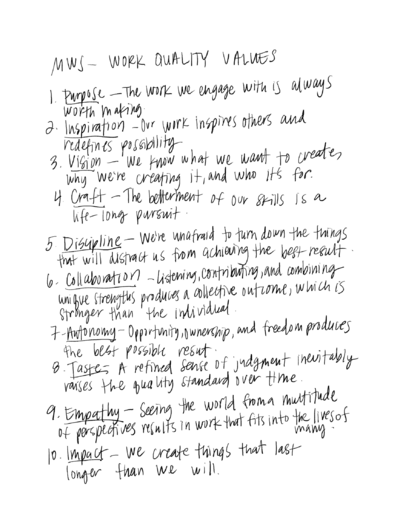
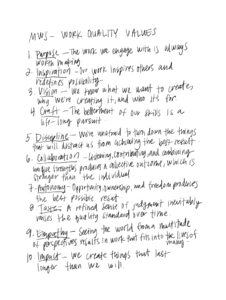
Sketch of Mouthwash’s work quality values
I want to finish with some more trivial questions. So for both of you, if you had to do another job at another time in history, what would it be and when?
AC
I would say architect. And, obviously being in LA we have amazing mid-century architecture— Neutra, Schindler, I can go on and on. But I would say that I originally wanted to be an architect when I was younger. So that would be my choice.
AT
I have such a hard time with this because I don’t know what else I’d be doing. I’d probably be a writer, I would probably try to write books or a biography. I’m insanely jealous of people like Walter Isaacson, who got to write a biography of Steve Jobs. So sharing the stories of people who have changed culture, and uncovering the things that people didn’t necessarily know about them.
Are there books which have helped you? Could be fiction. It could be anything outside design.
AT
There’s this book called Mastery by Robert Greene that I read when I was 20. I don’t know what I would think about it now, but at the time it was so impactful, to realize that mastering something, whether it’s in sport or design or cooking or education, requires the same mindset. And the steps that are needed to get there are the same. So the light bulb moment for me was, life is not about what you’re destined to do or the thing that you’re passionate about. It’s about the thing that you can create discipline around or create a sense of mastery around, and that methodology is applicable to literally anything. That really unlocked a lot for me because I used to think, “Oh, I’m not an artist. I didn’t grow up creative.” But I realized shortly after that book that you could apply that thinking to nearly anything.
AC
I’ll give you five real quick ones. Alex mentioned Steve Jobs’ autobiography by Walter Isaacson. I’d say that’s one of my favorite books just because I got so much from it and look up to him. Build by Tony Fadell is one of my favorite business books from a founder who makes products. Atomic Habits by James Clear. Elimination of Hurry is one of my favorite books. I’ve read it four times just because every year I get so overwhelmed and overstimulated and anxious that it feels therapeutic for my brain to read that book. And then Essentialism by Greg McKeown is a really good one if you haven’t read it. In a world where we have to make choices really fast, it’s about making the right ones and having the right perspective. So those would be the five I recommend.
Cool. Similar question — Is there an artist or person who has helped you, whether directly or indirectly?
AC
I’m a big Donald Judd fan, obviously, being from Texas. He’s taught me a lot about art presentation and philosophy and critique and all kinds of things. I could go on and on, but if I had to say one, he’d be my one.
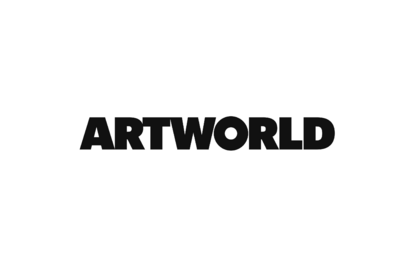
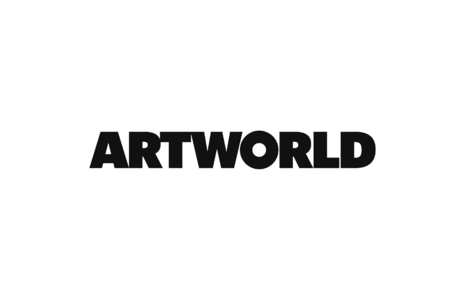
Artworld’s Logo
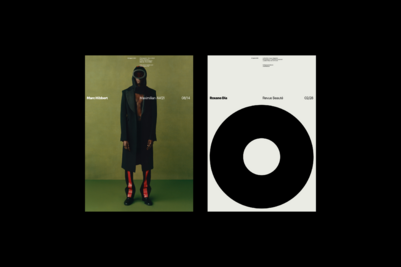
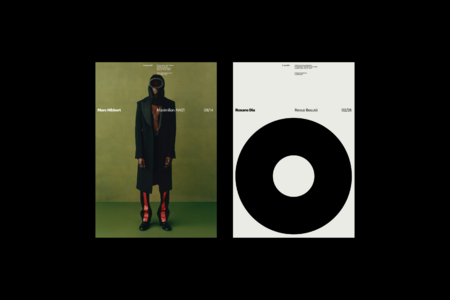
Artworld
The last question is, if someone is coming out of school and they want to launch a creative practice, what would be your one piece of advice?
AT
My piece of advice would be that you don’t have to make everything for everybody, but you can make everything for somebody. That really is the only thing that matters. So find a niche and fill it. So many times people try to communicate everything all at once, but you can find so much success in just being really focused on one thing. So find a way to be focused. Being focused is mostly about discipline. Don’t entertain or leave your options open to things that are not going to get you closer to that goal. That’s a really hard thing to do in the beginning, because you’re really hungry and you want to take every opportunity that you can. But when you realize that your time can be better used or spent doubling down on the things that you’re either great at already or more interested in, you’ll find out that you’ll go a lot further.
AC
I’d say inspire, tell a story, sell a vision. Be a yardstick of quality. And surround yourself with people that you enjoy being around. Because as you get older, you spend more time with your coworkers.
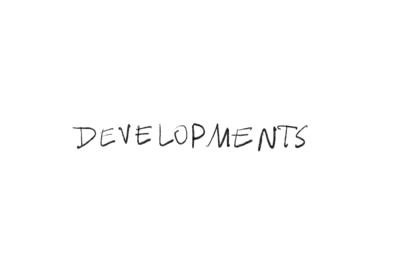
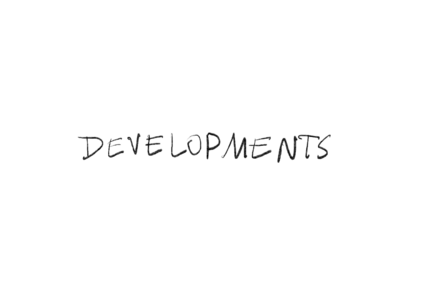
Sketch by Mouthwash Studio
